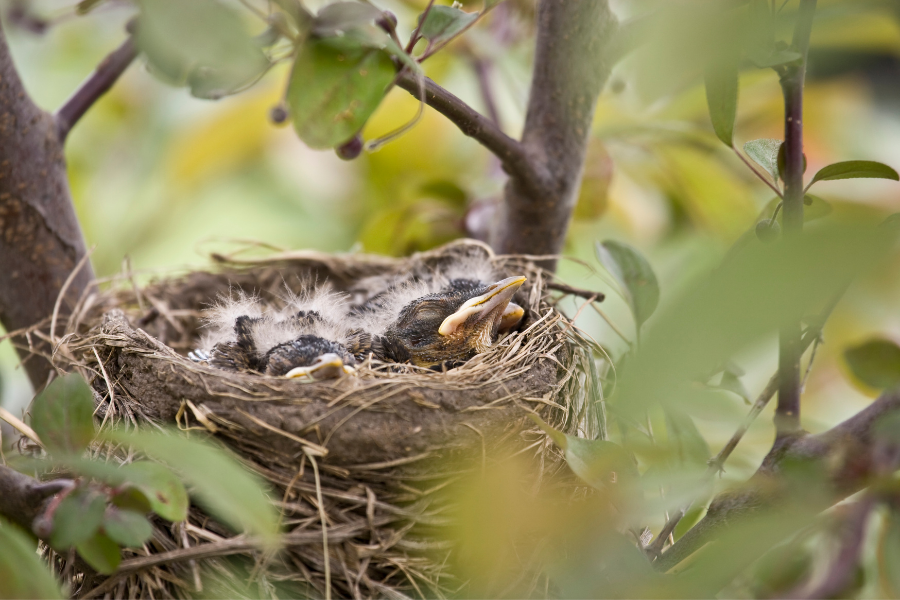READY TO GET STARTED?
REQUEST A FREE ESTIMATE
Fill out the form below or call (888) 466-7849 for a free, no-obligation estimate.

Birds are a vital part of Georgia’s ecosystem—but when they decide to build their nests in your vents, gutters, rooflines, or even inside your home, they can quickly become a nuisance. Bird nest removal isn’t as simple as grabbing a ladder and removing it yourself. In fact, depending on the bird species and the time of year, removing a nest may be illegal.
So, when is bird nest removal appropriate? And more importantly—when is it legal? Let’s take a closer look at when and how bird control should be done safely and within the law.
The short answer? Sometimes—but not always. Before you take any action, it’s crucial to determine:
Is the nest active? (Are there eggs or chicks inside?)
What type of bird built it?
Where is the nest located?
If the nest is inactive (no eggs or young), it’s typically safe to remove, but even then, it’s best to proceed cautiously. Many birds are federally protected, including common backyard birds like robins, blue jays, and swallows. Under the Migratory Bird Treaty Act (MBTA), it is illegal to destroy or disturb active nests of protected species without a permit.
Removing an active nest without authorization could result in serious penalties—even if the birds are causing issues.
The MBTA protects over 1,000 bird species, making it illegal to remove, relocate, or destroy their nests while they’re actively nesting (eggs or young present). This law helps preserve bird populations by ensuring birds can safely raise their young.
Even if a bird seems like a nuisance—leaving droppings on your porch, blocking vents, or squawking loudly—they still enjoy legal protections while nesting. That’s why bird pest control must be handled responsibly and often with professional help.
There are some situations where bird nest removal is not only appropriate, but necessary—especially when the nest:
Blocks ventilation or exhaust systems
Is located in or near flammable materials
Attracts insects or mold growth from droppings
Poses a health hazard due to excessive bird droppings
Is constructed in an unsafe location for humans or birds
Before nesting season (Late fall through winter in Georgia)
After the birds have left (Look for signs of activity like chirping, visible chicks, or parents coming and going)
If the nest is abandoned (Confirm there’s no activity over several days)
Important Tip: Always confirm the nest is inactive before removing it. If you’re unsure, contact a professional for help.
Relocating a bird’s nest is tricky—and usually not recommended without expert assistance. Moving a nest even a few feet can cause parent birds to abandon it entirely. And, again, if the bird species is protected, relocating the nest without a permit is considered illegal.
Instead of relocating, consider installing deterrents or barriers once the birds leave to discourage future nesting in that location.
The cost of professional bird nest removal near you varies depending on a few factors:
The location of the nest (Is it on the roof? Inside a wall vent?)
Whether the nest is active or inactive
The number of nests and types of birds involved
If cleanup and sanitation is needed (due to droppings or nesting materials)
It may seem harmless to let a bird build its nest near your home, but bird nests can create a number of problems:
Health hazards: Bird droppings can carry bacteria, fungi, and parasites harmful to humans.
Structural damage: Nesting materials can block vents and gutters, increasing moisture and fire risks.
Insect infestations: Nests attract mites, lice, and even beetles.
Recurring issues: Birds often return to the same nesting spot year after year.
If you’re seeing nesting activity in or around your home, the best approach is to call a bird control professional. They’ll identify the bird species, check for activity, and help you develop a plan for safe removal and future prevention.
Once the nesting season ends and it’s safe to remove old nests, take the time to bird-proof your home:
Install vent covers to block common entry points.
Use bird spikes or netting in problem areas like ledges and rooflines.
Keep outdoor lights and porches clean of droppings and nesting materials.
Trim back tree branches near windows and eaves.
Avoid leaving out open containers of food or water that attract birds.
Proactive bird pest control is the best long-term solution to avoid future nesting issues.
Birds are beautiful—but when they choose your home as their nesting spot, they can quickly become pests. Because many bird species are legally protected, it’s critical to understand when bird nest removal is allowed—and when it could get you into trouble.
When in doubt, don’t DIY it. Reach out to a licensed bird control company that can help you safely remove and deter problem birds without breaking the law.
Looking for bird nest removal near you in Georgia? Our trained professionals are here to help you protect your home and keep birds safely where they belong—in nature, not your vents.
Contact us today for safe, legal, and effective bird pest control services in Georgia!
Categories